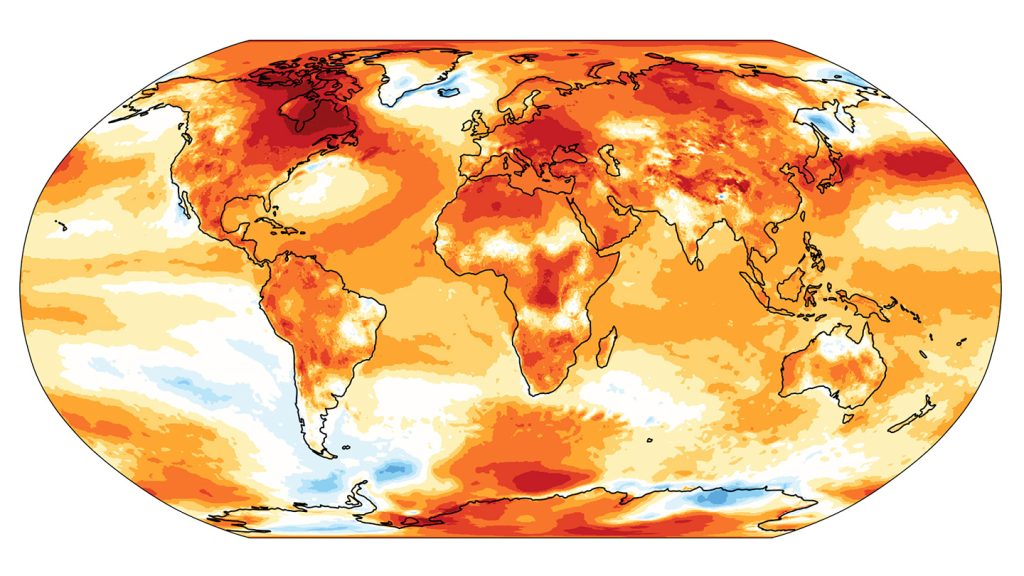2024: Earth’s Hottest Year on Record, Crossing the 1.5°C Threshold
The year 2024 has been officially confirmed as the hottest year on record, marking a significant milestone in the ongoing climate crisis. For the first time in recorded history, the planet’s average temperature exceeded 1.5 degrees Celsius above preindustrial levels, a threshold scientists have long warned about as a critical point of no return. This alarming development, outlined in a report by the European Union’s Copernicus Climate Change Service, highlights the accelerating pace of global warming and its far-reaching implications for the planet and its inhabitants. The report further underscores the severity of the situation by documenting the shattering of multiple other global records in 2024, including atmospheric greenhouse gas concentrations, air temperatures, and sea surface temperatures.
Unprecedented Temperature Rise and Its Global Impact
The global average temperature for 2024 reached 15.10°C, a staggering 1.6 degrees Celsius higher than the preindustrial average (1850-1900) and 0.72 degrees Celsius higher than the average from 1991-2020. This unprecedented temperature surge has had devastating consequences worldwide. The report details how 2024 witnessed a surge in extreme weather events, from raging wildfires and prolonged droughts to rapidly intensifying hurricanes. These events, amplified by the warming climate, underscore the interconnectedness of rising temperatures and the increasing frequency and intensity of natural disasters.
July 22, 2024: A Day of Extreme Global Heat
July 22, 2024, stands out as a particularly alarming day in the year’s climate record. On this day, the entire planet experienced extreme heat, pushing the average global temperature to a new high of 17.16°C (63°F). This single day serves as a stark reminder of the accelerating rate of global warming and the potential for even more extreme temperature events in the future. The intense heat experienced on this day had significant impacts across the globe, contributing to heat-related illnesses and deaths, disruptions to ecosystems, and increased energy demands for cooling.
The 1.5°C Threshold: A Critical Marker and a Call to Action
The crossing of the 1.5°C threshold is a critical marker in the climate crisis. The 2018 special report by the Intergovernmental Panel on Climate Change (IPCC) emphasized the importance of limiting global warming to well below 2°C, preferably to 1.5°C, compared to pre-industrial levels. The report detailed how exceeding this threshold would significantly increase the risks of irreversible changes to the Earth’s climate system, including sea level rise, extreme weather events, and biodiversity loss. While pockets of the planet have temporarily exceeded this threshold in previous years, 2024 marks the first time the entire globe surpassed this crucial limit.
The Urgency of Addressing Climate Change
The findings of the Copernicus report reinforce the urgent need for global action to mitigate climate change. The rapid warming trend, the increasing frequency of extreme weather events, and the crossing of the 1.5°C threshold all point to the dire consequences of inaction. The primary driver of this warming is human activity, particularly the burning of fossil fuels, which releases greenhouse gases into the atmosphere. Reducing greenhouse gas emissions through a transition to renewable energy sources, improving energy efficiency, and adopting sustainable land use practices are crucial steps in addressing the climate crisis.
The Role of Science Journalism and Public Awareness
In this crucial time, the role of science journalism in communicating the realities of climate change to the public is paramount. Accurate and accessible reporting on climate science, its impacts, and potential solutions is vital for raising public awareness and informing policy decisions. Supporting science journalism and fostering scientific literacy are essential for empowering individuals and communities to make informed choices and advocate for policies that address the climate crisis. The stark reality of 2024’s record-breaking temperatures serves as a wake-up call, emphasizing the urgency of addressing climate change before its consequences become even more devastating and irreversible.















